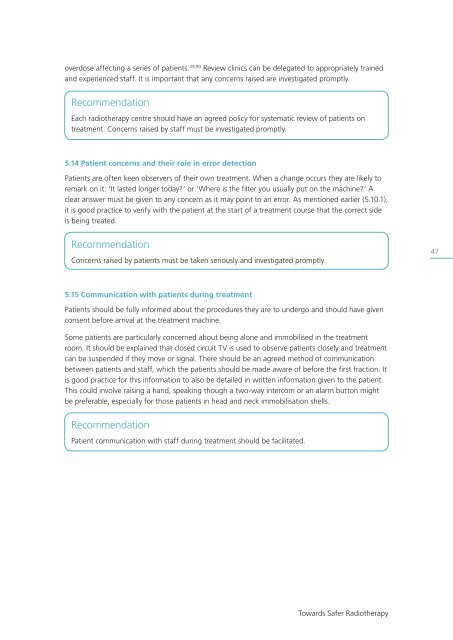Towards Safer Radiotherapy
Towards Safer Radiotherapy
Towards Safer Radiotherapy
You also want an ePaper? Increase the reach of your titles
YUMPU automatically turns print PDFs into web optimized ePapers that Google loves.
overdose affecting a series of patients. 39,90 Review clinics can be delegated to appropriately trained<br />
and experienced staff. It is important that any concerns raised are investigated promptly.<br />
Recommendation<br />
Each radiotherapy centre should have an agreed policy for systematic review of patients on<br />
treatment. Concerns raised by staff must be investigated promptly.<br />
5.14 Patient concerns and their role in error detection<br />
Patients are often keen observers of their own treatment. When a change occurs they are likely to<br />
remark on it: ‘It lasted longer today?’ or ‘Where is the filter you usually put on the machine?’ A<br />
clear answer must be given to any concern as it may point to an error. As mentioned earlier (5.10.1),<br />
it is good practice to verify with the patient at the start of a treatment course that the correct side<br />
is being treated.<br />
Recommendation<br />
Concerns raised by patients must be taken seriously and investigated promptly.<br />
47<br />
5.15 Communication with patients during treatment<br />
Patients should be fully informed about the procedures they are to undergo and should have given<br />
consent before arrival at the treatment machine.<br />
Some patients are particularly concerned about being alone and immobilised in the treatment<br />
room. It should be explained that closed circuit TV is used to observe patients closely and treatment<br />
can be suspended if they move or signal. There should be an agreed method of communication<br />
between patients and staff, which the patients should be made aware of before the first fraction. It<br />
is good practice for this information to also be detailed in written information given to the patient.<br />
This could involve raising a hand, speaking though a two-way intercom or an alarm button might<br />
be preferable, especially for those patients in head and neck immobilisation shells.<br />
Recommendation<br />
Patient communication with staff during treatment should be facilitated.<br />
<strong>Towards</strong> <strong>Safer</strong> <strong>Radiotherapy</strong>



